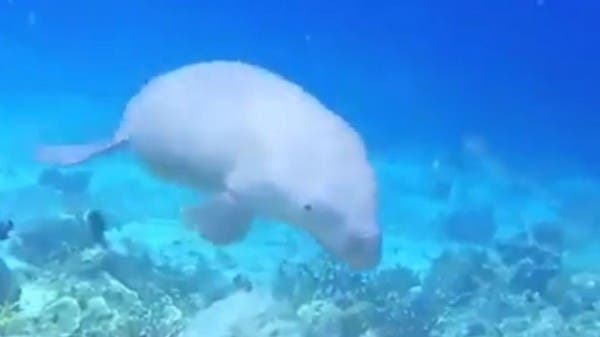Underwater video of a rare fish in the Red Sea
Egyptian divers have monitored the appearance of a rare and endangered fish in the waters of the Red Sea, particularly near the coast of the city of Marsa Alam, in the south of the country.
Your browser does not support HTML5 videos
Divers documented on video the moments of the appearance of the fish, which they call “the dugong animal”, in the Abu Dabbab area, on the coast of Marsa Alam in the Red Sea Governorate.
Marine scientists revealed that the fish feeds on grass, lives up to 100 years and has a large mouth from which two long fangs emerge.
They also added that the fish resides in the Marsa Mubarak area, 60 kilometers north of the city of Marsa Alam, near turtles and dolphins, as well as in the Abu Dabbab and Tendaba areas and south of the city of Shalatin.
Gives birth and breastfeeds
In turn, Ashraf Siddiq Mohamed, professor of marine fisheries at the National Institute of Marine Sciences in Hurghada, told Al Arabiya.net that the “dugong” or “mermaid” is not like other fish, since it is one of the best known fish mammals of the Red Sea.
He added that it breathes atmospheric air, its skin is covered in hair, it lives in large waters, gives birth and breastfeeds, and possibly feeds on marine plants.
She also explained that she lives to be between 80 and 100 years old, continues to carry the fetus in her stomach for 14 months and spends two years caring for her little ones after birth until they are able to rely on themselves.
Eating grass
In addition, he pointed out that the “Dugong” fish eats large amounts of grass daily, which can reach 40 kilograms, and fishermen call it “skin”, and in the Arabian Gulf it is called “dugong”, while there is another name for it, which he is “Si Kawi”, and none of his species remain except him, while the rest of the species became extinct.
He revealed that the animal has environmental and scientific importance for Egypt, as it feeds on grass, which helps to fertilize the area, prune the soil and increase its productivity capabilities, and therefore helps to provide primary food raw materials for small organisms. which requires the region to grow and multiply multiplicatively and enrich it with marine organisms, adding that the animal goes out into the areas, the sand is exposed to sunlight and then returned to the water again.
—
Read also

